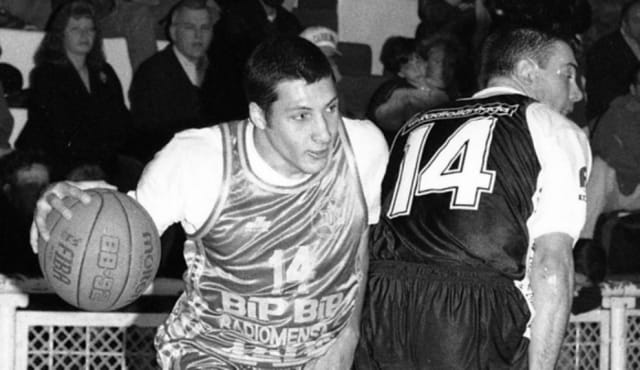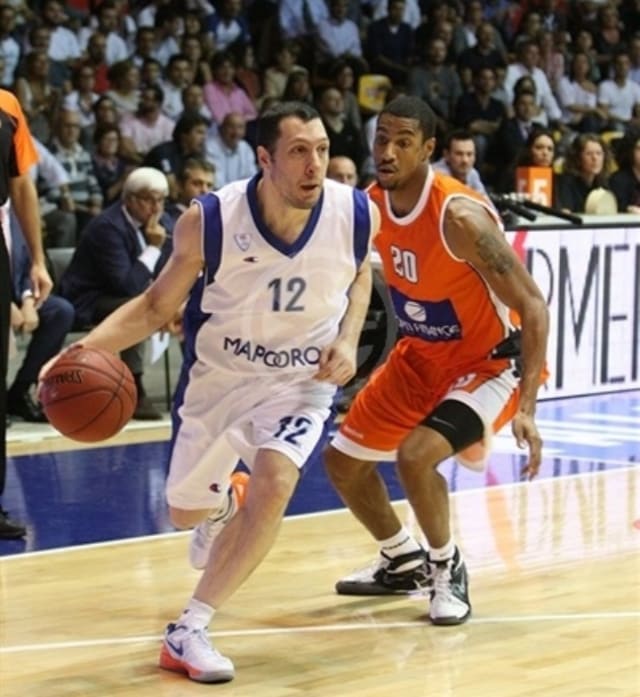Mazzarino, love and fear for basketball
Nicolás Mazzarino listens to the reason behind this interview and remarks, in resignation but laughingly, “I imagined so, what else could we talk about?”
Nicolás Mazzarino listens to the reason behind this interview and remarks, in resignation but laughingly, “I imagined so, what else could we talk about?”
Well, with this Uruguayan, who’s been among the most outstanding in his country’s basketball for a long time, it’s easy to talk about many things. His solid 25-year professional career (yes, the number is correct — 25 years professionally) offer many subjects to address. However, he’s right, we came to him to ask him how it is to play top-tier at 43 years of age, when so few achieve to do so.
That's what it's all about — it's not about staying active or being part of a roster as a testimony to your presence. No, it's about competing, it's about staying relevant and even influence the game. His numbers vouch for him. In the Group A of Liga de las Américas, Mazzarino, despite Malvín’s elimination, contributed 16 points with a valuable 43% in three-pointers in an average of 29 minutes. “Although I should be enjoying this more at my age, when we lose or things don't go my way, I still get frustrated. I'm as demanding as when I was younger, and I don't know if it's OK to be like that. But that attitude, perhaps, is what allows me to carry on forward. It’s not common to be playing at 43, I never imagined that. But with what happens in the court, I feel that my level is acceptable, and that I can go on,” explains the player born in the city of Salto, which borders Argentina.
As time goes on in our conversation, Mazzarino lets loose and states: “I came to Liga de las Américas, a very demanding tournament, after getting a lot of heat in San Pablo, and I ended with good statistics. I'm surprised of myself. My role today should be secondary, but although I'm not the main figure, I still play an important part. And when I see that I played an average of almost 29 minutes, I get scared. It's a lot for my age, it wears me down. But at the same time, it motivates me.”
The Malvín player assures that he doesn't care how rivals see him, but he laughs when he says that “both my teammates and rivals must see me like the old guy from the Uruguayan League. Now I'm even playing with the children of former teammates... I don’t see anything special in the crowd. Malvín (fans) love me and rival (fans) insult me. But I must acknowledge that I feel respected. This must be because I never caused any conflicts or controversies in my whole career. The problem is that many forget that I'm 43 and expect from me as if I were 30. I myself sometimes say: “Hey guys, I'm 43, understand that.” In Malvín’s roster, when they do or say things, I have to get down to the little guys’ level to understand and participate in the group. They're from a very different generation from mine.”
Mazzarino acknowledges that he has to assume a leadership position in the group, although he says that he does it his way, “saying few things. I try to help without being overbearing. I was also young once and I didn't like having veterans on my back. That's why I don't talk much, and I try to set an example with my actions.”

Since his debut in 1994 and after eight years in Uruguayan basketball, Mazzarino challenged himself and tried his luck in other leagues. In 2002 he moved to Argentina to play the final part of the 2001-02 season, and from there he crossed the ocean to Italy, where he played 11 campaigns. “I thoroughly enjoyed my time in Europe, (and) their professionalism, where you only have to think about playing basketball. But in 2013 we took a family decision to return with my wife to Uruguay, considering bringing up our children. Besides, I didn’t want to stay in Italy and not play and I wanted to return to Uruguay in a good level. But the important thing is that we prioritized on our family, which for me is the most important thing,” says Magela’s husband. She’s also from Salta and they've been together for 23 years. They have two children: Franchesco, 16; and Delfina, 12.

A key question is: why keep playing at 43? The answers are many but Mazzarino, as convincing as when he scores one of his usual three-pointers, points out two that bring tears to our eyes: “Because I'm afraid of retirement day and because after 34 years in this career, I still love playing basketball as much as when I started at nine years of age.” The abrupt silence leads him to give us more details and he adds that his life “has always been very routine-oriented. I lived to be a player and I did everything I had to do. Although I have several business investments, it's hard for me to leave. I don’t know how my life will be after playing. I don’t know how I’ll react, if I could continue active as a coach. I keep enjoying basketball and I intend to continue until I can’t do it anymore. I'm mentally perfect, but my body starts abandoning me more and more.”
When reviewing Mazzarino’s sports feats, you may find five titles in Montevideo’s Torneo Federal (one with Hebraica Macabi and four with Welcome) and, more recently, three others in the Uruguayan League, with Malvín. Add to this the Campeonato Sudamericano with his country's national team and a bronze medal in the Pan-American Games. Nonetheless, he assures that: “considering all the years I've played, they seem like few titles. But all the same, I'm satisfied with my career. If I didn't achieve anything else, it's because I didn't have the capacity to do so. I gave everything I had, I didn't keep anything. I don’t regret any decision. What I achieved is what I am.”
Another mystery of no lesser importance is, up to when does he intend to keep playing? Mazzarino remembers that “when I came back from Italy, I signed for three years, thinking that that would be the end. But then I signed for another season. And then for another. Let's see (what happens) when this League is over. I don't set a limit on myself. If I continue as I've had up until now and Malvín or any other team wants me, why shouldn’t I go on?
A professional career of 25 years seems astoundingly long. So much so that it’s hard to look back clearly. However, the Uruguayan guard is quite clear about “where I'm from: a small city where I learned to play in an open court, even when it was raining. I had to leave Salto at 15, leave my family and my friends, and be alone in Montevideo to be able to reach my dream of becoming a basketball player. And I see clearly as well that I got to be a professional player in Uruguay and that I lived for 11 years in Italy, which was what I most enjoyed of my career. I lived the demands and the comfort of being a professional. Good things, such as the friends I made and everything I learned — more from the losses than the triumphs. There were also bad things, such as not arriving from Europe on time to see my dad before he died. But I don’t regret anything, I was happy throughout this journey.”
Looking forward, Mazzarino's feared future doesn't seem to be far away from basketball. And the first thing he’ll do the day after will be assuming the coaching task. “When the time comes to retire, I imagine it’ll be a sad moment. Maybe a way to not suffer it as much would be to continue as a coach. In 2013, thinking that the end was near, I did the coaching course. I got the title, but it's been in the drawer for now. We’ll see what happens when the time comes, if I'm up for the task, if I'm good or if I like it. I’ll have to try it,” he says, leaving the question open.
Before concluding our conversation, we asked Mazzarino if he felt uncomfortable having to share his feelings as an athlete of an uncommon age. “No, quite to the contrary, I love talking about my experiences in basketball. In my glory years I wouldn’t think about it because I was focused on the game. That could've been a mistake. Now I like to talk about my sports life. I enjoy it. For some it might not be as exciting, but that's my life — the one that I knew how to build.”
FIBA